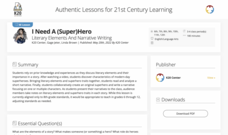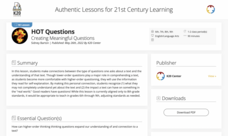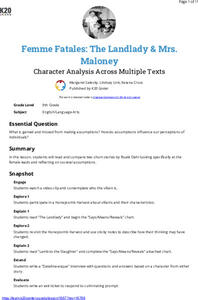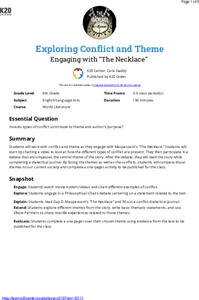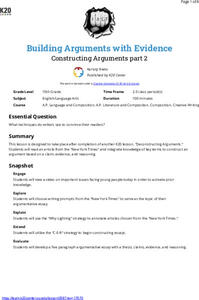K20 LEARN
Let Us Start The Lettuce Club (Or Not): Writing A Thesis Statement
Let us be frank! Writers learn that crafting a thesis statement is not that difficult if one peals back the layers. After watching several videos about the elements of a thesis, class members read the article "Lettuce Club helps students...
K20 LEARN
Ichabod and Brom - Two Wild And Crazy Guys: Characters' Differing Perspectives
After reading Washington Irving's "The Legend of Sleepy Hollow," class members compare the characteristics of Ichabod Crane and Brom Van Brunt. Next, they read an article about ghosts that supposedly haunt the campus of Oklahoma...
K20 LEARN
Ichabod and Brom - Ghostfacers: Credibility and The Legend Of Sleepy Hollow
A headless horseman? Really? A reading of "The Legend of Sleepy Hollow" launches a study of how to use the A-CLAP strategy to determine a story's credibility. Writers employ these techniques to craft their ghost stories and make them...
K20 LEARN
I Theme, You Theme, We All Theme For Ice Cream: Themes In Literature
Teach readers how to distinguish between a topic and a story's theme in a short lesson that uses the children's book, Should I Share My Ice Cream, as an exemplar. After listening to the story, pairs generate a list of topics covered in...
K20 LEARN
I Need A (Super)Hero: Literary Elements And Narrative Writing
Need a hero? Super! Groups create their modern-day marvel and craft a narrative with all the elements required in such a tale.
K20 LEARN
Freedom And Restraint: Elements Of Fiction
Kate Chopin's short story, "The Story of an Hour" and John H. Young's "Our Deportment, or the Manners, Conduct, and Dress of Refined Society" offer high school juniors an opportunity to compare the role of women in the 19th century with...
K20 LEARN
HOT Questions: Creating Meaningful Questions
Scholars examine a list of questions and sort them into corresponding groups based on similarities. A gallery walk allows peers to see how their peers sorted questions and leave notes. Costa's Level of Questions is the topic of a...
K20 LEARN
Friends, Romans, Countrymen, Lend Me Your Emotions: Julius Caesar
Scholars, high schoolers, class members! With the help of this lesson, you too can identify the three persuasive appeals (ethos, pathos, and logos) the characters in William Shakespeare's tragedy Julius Caesar used to convince their...
K20 LEARN
Growing Themes
The theme of a work is not a single word! Rather it is a statement that reflects what a writer believes or wants readers to understand about a topic or subject. Here's a short, but powerful lesson that utilizes passages from The...
K20 LEARN
From Apples To Oranges: Examining Literary Devices
Make learning the definitions of literary terms memorable with a fun and engaging activity. Teams of scholars are given several terms and create an acrostic poem with simplified definitions and examples.
K20 LEARN
Femme Fatales - The Landlady and Mrs. Maloney: Character Analysis Across Multiple Texts
Two stories by Roald Dahl, "Lamb to the Slaughter" and "The Landlady" provide readers an opportunity to compare stories by the same author. After a close reading of the stories, teams select a character from one of the tales, craft...
K20 LEARN
Ethos, Logos, Pathos: Persuading Your Audience
Ethics, emotion, reason—scholars investigate advertisers' persuasive techniques to attract buyers. After examining the techniques used in infomercials, writers craft a persuasive essay on a topic of their choice.
K20 LEARN
Diggin' Deeper - Poetry Made Relevant: Poetry And Poetic Devices
What do Beethoven, Bob Dylan, and Pharrell all have in common? Works by these three musicians are used to launch a study of poetry. Class members listen to passages from the music and craft a quick write about how the music makes them...
K20 LEARN
Brushstrokes: Communication/Using Descriptive Language
Sometimes a picture reflects a thousand descriptive words. To illustrate the importance of sensory words in descriptive writing, scholars listen to a song and craft a painting in response. After sharing their work with the class,...
K20 LEARN
Criminal Motivations: Irony and Characterization In "The Cask Of Amontillado"
Edgar Allan Poe's short story "The Cask of Amontillado" is a bit of a puzzle. Critics have long debated Montresor's motives for killing Fortunato. Young scholars examine examples of the three types of irony (verbal, dramatic, and...
K20 LEARN
Can You Tell Me Tales? Themes In Literature
"The Wife of Bath's Tale" and "The Pardoner, His Prologue, and His Tale" from Chaucer's Canterbury Tales take center stage in a lesson that asks scholars to update the tales, craft a script, and either video their version or act it out...
K20 LEARN
Exploring Conflict And Theme: Engaging With "The Necklace"
Teach young scholars how to determine the theme of a story, an insight the author wants to share with readers, with a lesson that uses Guy de Maupassant's "The Necklace" as an anchor text. Learners examine the internal and external...
K20 LEARN
Between The Lines: Inferences In The Narrative Life Of Frederick Douglass Excerpt
Good literature can be much like an iceberg requiring readers to presume that the bulk of the meaning may be inferred to be found below the surface. Here's a lesson that asks scholars to conduct a close reading of passages from The...
K20 LEARN
Blackout Poetry: Re-Envisioning Writing
Introduce young poets to Blackout Poetry. Much like Found Poems, Blackout Poetry challenges scholars to rethink the process writers may use to craft their poems. After watching a short video in which poet Austin Kleon describes his...
Overcoming Obstacles
Giving Presentations
With their action plans in place, groups now develop a presentation to get others interested in their project. Scholars learn how to present themselves during a presentation and elaborate on and add visuals to their presentation. After...
K20 LEARN
Being Mindful Of Sadness In "The Scarlet Ibis": Theme And Characterization
James Hurst's short story "The Scarlet Ibis" provides readers with an opportunity to consider how they can support others who are experiencing distress. Participants learn self-care tips and connect to the short story's characters. They...
K20 LEARN
Building Arguments With Evidence: Constructing Arguments Part 2
The second session in the two-part "Building Arguments with Evidence" lesson asks scholars to craft an argument essay on a topic of interest to them. Writers establish a claim, locate evidence, and justify their stance.
K20 LEARN
Arguing With Evidence: Deconstructing Arguments Part 1
In the first lesson in a two-part series, high schoolers pick a social issue important to them and examine an article about the topic, the arguments and evidence used to support the writer's stance, and craft two counter-arguments to the...
K20 LEARN
#Summarize: Summarizing
What are the effects of one's life experiences? Class members view a slam poetry reading, a speech by President Obama, and read a short story by John Steinbeck about responding to tragedies. They summarize these events and then craft a...






